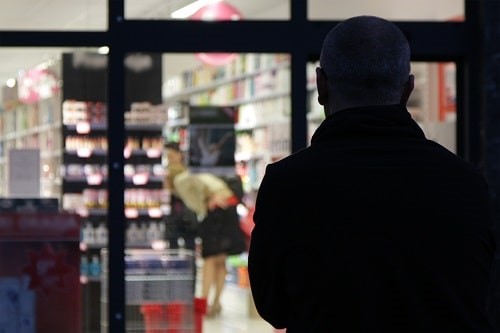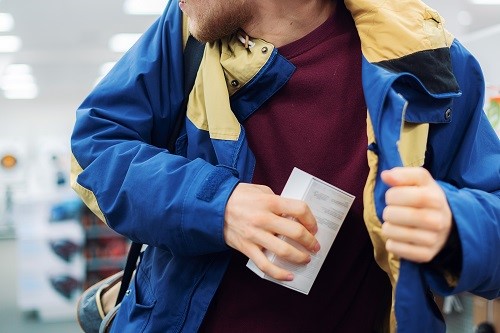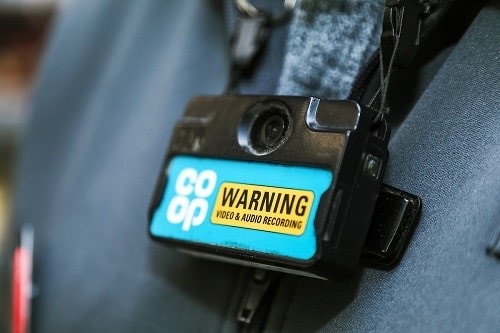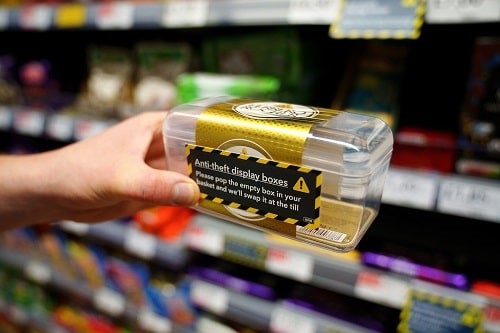Shoplifting is on the rise, and with it the violence and intimidation of those who work in shops. We investigate whether body-worn cameras are an effective deterrent.
Features
Can cameras save our shop workers from attack?
Paul and his colleagues knew their shop was about to be attacked. Word had got out about a gang targeting and robbing stores along the M5 corridor, and staff at the big supermarket in Devon where he works began to prepare by putting on body-worn cameras.
“A lot of the evidence, we gathered from just watching them [steal] – they were a professional gang, so obviously you can’t interfere,” he recalls today, adding that it went well. Police were sent the footage.
“Cameras get a bad press but actually when they’re utilised for safety and evidence-gathering they are a wonderful tool.”
 Most violence against shopworkers is triggered by shoplifting, the factor behind six in ten incidents recorded by Usdaw. Photograph: iStock
Most violence against shopworkers is triggered by shoplifting, the factor behind six in ten incidents recorded by Usdaw. Photograph: iStock
Body-worn cameras are taking off in the fight against retail crime and violence. But are they an effective way of protecting staff and dealing with the problem? Or are there are other solutions? Safety Management investigates.
Weekly attacks
We British might be famous for our reserve and politeness, but that’s not what we’re seeing in our shops.
Shopworkers are facing a tide of violence and abuse with two in five shopworkers shouted at, spat on, or threatened every week, according to a Retail Trust survey.
Further, 14 per cent said they had been physically assaulted. It means that around two-thirds, or 66 per cent feel anxious about going into work and 42 per cent are considering quitting their jobs or leaving retail altogether.
A sharp upturn
For several years the problems of violence and abuse in shops was being contained, and in some respects reduced, says Usdaw, which has tracked the issue for the past twenty years.
However, in the years before the coronavirus pandemic, they saw ‘disturbing evidence’ of a sharp upturn. Between 2016 and 2022, the proportion of workers experiencing verbal abuse jumped from just over half to more than two-thirds.
 Aside from the pandemic, when frustrations about lockdown increased attacks, the past year (2022) is the worst on record for violence against shopworkers. Photograph: iStock
Aside from the pandemic, when frustrations about lockdown increased attacks, the past year (2022) is the worst on record for violence against shopworkers. Photograph: iStock
Aside from the pandemic, when frustrations about lockdown increased attacks, the past year is the worst on record.
We speak to Tony Whelan, health and safety officer at Usdaw to find out why and how he worries 2024 will be no different. He says that shoplifting surged by 25 per cent last year, according to the Office for National Statistics. At the same time, most violence against shopworkers is triggered by shop lifting, the factor behind six in ten incidents recorded by the Union.
“Moving out of the pandemic, shoplifting has become the main trigger for violence and abuse. It is going hand in hand [with shoplifting],” he says.
‘It was terrifying’
Sarah, 37 is an eyewitness of quite how bad the problem has become. The lawyer and her boyfriend got locked in her local supermarket in London when staff and security fled what had developed into a full-scale punch up between a customer acting as a ‘citizen hero’ and a looter, who was emptying shelves. “It was terrifying, we had to hide behind the aisles,” she recalls. “Now every time we shop, we wonder if the same thing will happen.”
Indeed, Paul Gerrard, director of public affairs at the Co-op speaking recently on the BBC’s Today programme, says criminals are getting fearless: “[We are] seeing individuals and organised gangs coming in to take out the entire meat section, the entire spirit section, the entire household cleaning section, and those kind of individuals will stop at nothing.”
Certain items such as luxury clothing and accessories are being targeted by organised gangs to be stolen online – lured by the ease in which they can be resold and an increased sense of immunity. Since 2015, shoplifting anything under £200 has been downgraded to a ‘minor crime’ meaning the worst that can happen is a small fine.
Safety – at the touch of a button?
Body-worn cameras are fast becoming the weapon du jour against such a wave of crime. In September, Aldi announced it was trialling them following in the wake of Tesco and Morrisons.
 Co-Op has been using body-worn cameras since 2019. Photograph: Co-op
Co-Op has been using body-worn cameras since 2019. Photograph: Co-op
Steve Logue, Head of Operations Support Centre at Co-op tells us the chain has been using body-worn cameras since 2019. “Co-op has a targeted approach,” he says. “The technology is used in stores where there is a particular local challenge with crime or anti-social behaviour.”
How do they work? “The cameras are turned on by the colleague should they feel at threat of violence or, to record crimes,” he explains. “At the touch of a button, the cameras send real-time audio and visual footage to our security operations centre.”
Footage can then be dynamically risk assessed by trained operatives in security and, should it be required, support can be given to staff under attack. “The security centre will also call the police as appropriate, escalating immediately if there is a risk to the colleague or customers. This footage is also used for evidential purposes and is provided to the police on request.”
Police – missing in action?
The problem is that for the cameras to work, there needs to be the threat of the police arriving and doing something with the evidence.
But according to Whelan, staff aren’t always reporting attacks because they don’t think anything’s going to happen: “They don’t have any confidence in the justice system for a crime to ever get that far.”
Indeed, new figures, obtained by the Co-op in a Freedom of Information request, show that police fail to attend more than two-thirds of serious retail crimes. Waitrose and John Lewis are even reportedly offering free coffees to police officers in a bid to attract their attentions.
Logue says more police support is key for body-worn cameras to offer a meaningful form of protection: “Co-op has called for urgent change in Police response and for all Forces to target repeat and prolific offenders to reverse the environment in many cities where criminal gangs operate exempt from fear of consequences,” he says.
 ‘Dummy’ or empty packaging on shelves can deter bulk-theft or ‘looting’. Photograph: Co-Op
‘Dummy’ or empty packaging on shelves can deter bulk-theft or ‘looting’. Photograph: Co-Op
An Action Plan
The government says it is tackling the issue. Its Retail Crime Action Plan, launched in October, commits the police to prioritise attending the scene of shoplifting instances involving violence against a shopworker.
A new intelligence team, Project Pegasus, will also share data and resources to target criminals, partly funded by stores including John Lewis, the Co-op and M&S.
Logue says this is a “welcome and reassuring move”. But he adds: “We very urgently need to see it in action in our stores, so the desperate calls to the police from front line colleagues are responded to and the criminals start to realise there are real consequences to their actions, and that they will be caught and charged.”
‘Not a silver bullet’
But do body-worn cameras work to protect workers? According to Usdaw’s latest report, just 2 per cent of shopworkers believe they are the solution to tackling violence and abuse, preferring management support (40 per cent), more security staff (14 per cent) and to ban offenders from their shops (16 per cent).
According to Adrian Beck, Emeritus Professor, Department of Criminology, University of Leicester, who has worked with the Co-op to provide insights, there are also potential challenges with body-worn cameras, including privacy concerns, data management, and costs. “Retailers will need to ensure they have policies in place to address these issues, including guidelines on when and how body-worn cameras should be used, how footage should be stored and managed, and how privacy concerns should be addressed.”
Still, early evidence shows that they can be effective. The ECR Retail Loss Group found in its 2020 report based on interviews with 22 retailers from the US and Europe, that violent and verbal abuse incidents reduced by about 45 per cent when body-worn cameras were used.
Logue says that a reduction in confrontation has been seen in Co-op stores where cameras have been introduced. A 2016 study by Cambridge University found that body-worn cameras can help both sides behave better, with police modifying their behaviour and the public becoming more co-operative.
However, no one we spoke to thinks that cameras are a strong enough protection against prolific offenders, including those with drug or alcohol addictions: “Having a camera doesn’t make me feel safer, it makes it more likely that we’ll get a conviction, it provides evidence,” stresses Paul.
So – body-worn cameras, a positive development or a sticking plaster? Despite concerns some customers or even workers might have about being ‘under surveillance’ the real worry isn’t the cameras, but the reasons shops are resorting to them: “It’s debatable whether we should be at that point where you have to have a body camera to go and to do your job, but unfortunately that’s the society as it is now,” says Whelan.
“It’s not for supermarkets to change society as it is. It’s for the government to address the root causes.”
“Body cameras are not a silver bullet panacea,” he adds. “It’s about providing a suite of measures, not just ‘let’s give you a camera and everything’s going to be fine’.”
FEATURES

How to build circular economy business models
By Chloe Miller, CC Consulting on 07 April 2025
Widespread adoption of a circular economy model by business would ensure greater environmental and economic value is extracted and retained from raw materials and products, while simultaneously reducing carbon emissions, protecting the environment and boosting business efficiency and reputation.

What does the first year on an accelerated net zero path have in store for UK businesses?
By Team Energy on 07 April 2025
The UK is halfway to net zero by 2050 and on a new, sped-up net zero pathway. In light of this, Graham Paul, sales, marketing & client services director at TEAM Energy, speaks to TEAM Energy’s efficiency and carbon reduction experts about the future of energy efficiency and net zero in the UK.

Aligning organisational culture with sustainability: a win, win for the environment and business
By Dr Keith Whitehead, British Safety Council on 04 April 2025
The culture of an organisation is crucial in determining how successfully it implements, integrates and achieves its sustainability and environmental goals and practices. However, there are a number of simple ways of ensuring a positive organisational culture where everyone is fully committed to achieving excellent sustainability performance.



